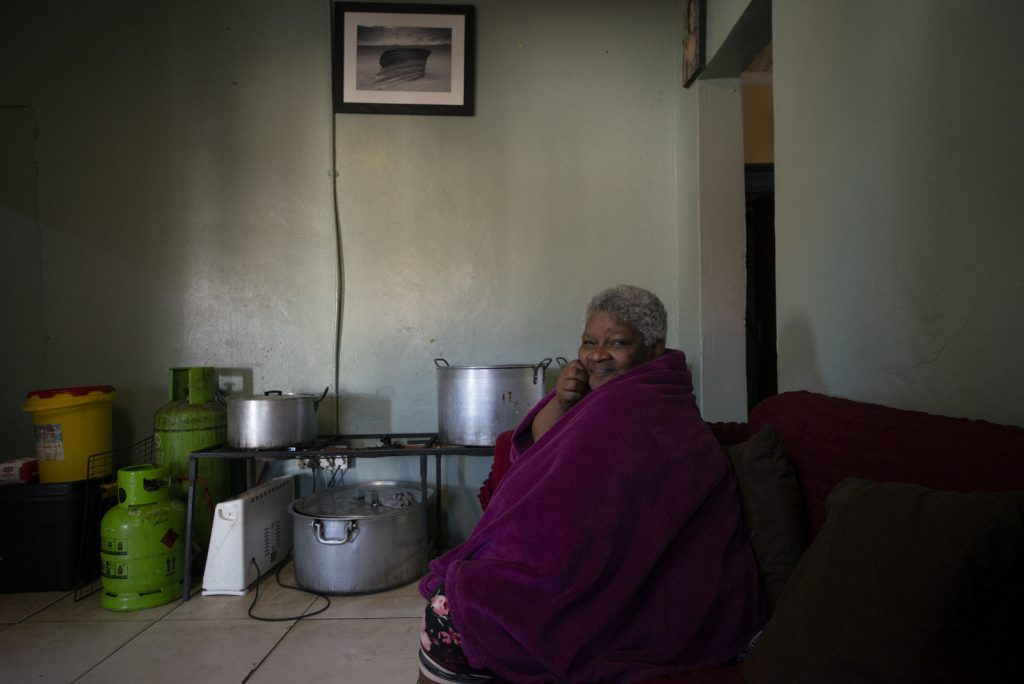Would you open your home to children who have nowhere else to go after school? Some women in Cape Town’s largest townships do just that. (All photos: David Harrison)
Empty streets might be a common sight in areas where everything a child needs is inside the safety of a home enclosed with fencing. But in Section 4 of Gugulethu, in Cape Town, streets play a much wider role than just a road leading home.
Here, the streets, similar to many informal settlements, are the market stand for fruit and vegetable vendors, the church for street pastors, the battlefield for gangs and the trading ground for drug dealers. Somewhere in between this buzzing adult world, the streets are also the playground for thousands of children – whether safeguarded by a guardian or completely unattended.
Latita Nqintizi, a grade nine learner at Fezeka High School, is well aware of the difficulties some of her classmates face, particularly those who end up becoming drug addicts and, eventually, homeless.
Latita is one of the 17 children who live with her foster mother Thobeka Mapapu in Gugulethu. She has been in Mapapu’s care since infancy and regards her as her real mother.
In 65-year-old Mapapu’s home, Latita feels “safe, nurtured and positive of what the future holds”.
She has already decided on a career path – medical science – and is determined to follow through. When she is not studying or practising netball, she plays drums to the beat of children’s laughter, dancing and singing.
Mapapu is one of about 30 women who follow an open-door policy for children who would otherwise end up on the streets after school hours.
The endeavour started in 2018 when the group realised the “extreme danger” children were exposed to when they roamed the streets after school. After establishing the refuge network, the women became known as the Afternoon Angels.
Despite having limited resources, no formal training or funds, the Afternoon Angels were able to offer a safe space for children and the project continues to this day.
“Sometimes the women would see a child sitting on the street being hungry. They would collect the child and offer them a slice of bread with some butter,” said Pamela Phuphu, a programme coordinator at Ikamva Labantu.
Ikamva Labantu is a non-profit functioning as a development catalyst for community-based social service and economic empowerment programmes. It partnered with Afternoon Angels in 2020 to provide support and training for the women facilitating the after school programmes.
“The women saw the kids moving up and down the streets after school and they were very concerned about that, because children are being killed, abused, raped and children get mixed up with drugs, so the mamas tried to defend the children from that by creating spaces where they can come and play, and help them with their homework, until their parents [return from work],” says Phuphu.
Today, the children have access to games, toys, books, hygiene packs, school stationery, uniforms and adult supervision. They also have access to health and psychosocial services.
Phuphu is a former house worker who has become a community worker. She has been the programme coordinator at Ikamva Labantu for 17 years. She oversees training programmes for the mothers who run the after school homes as well as the programmes presented to school-age children.
About 1 500 children in Khayelitsha, Gugulethu, Langa, Nyanga, Philippi and Delft benefit from the “home-based sanctuaries” initiative.
At Mpapu’s home, about 30 children stand ready to receive a hearty meal. While they wait, they sing, dance and play. Although noisy, the laughter and yells of the children exude excitement and happiness.
For a moment, Latita – stationed at the drums – breaks away from her entertainment role to speak to Mail & Guardian.
After listening to Latita’s dreams and plans for the future, the conversation takes a melancholy turn. Aside from violence, rape and murders, there are other impediments threatening the future of her classmates.
“Most of all it is hunger. People are hungry,” she says without hesitation.
“There are a lot of soup kitchens that offer food, and people come in large numbers to receive a portion of food, but some go home without any food as there are too many people and not enough food.
“I feel sorry for them, because you can recognise a person who is hungry and in need of this food,” says Latita.
 Thobeka Mapapu
Thobeka Mapapu
She is also troubled by teenage pregnancies and drug abuse among learners in her age group. These difficulties, she says, are the result of negligence at home and having no expectations of a better future.
”You can see a child has intelligence and wants to learn but at home he or she is being neglected by the parents who do not even care about the child,” Latita says, adding that a friend of hers had veered into drug addiction “because of all the stress”.
“First of all, it is at home, secondly at school, so she or he thinks the best option is to be a drug addict,” she says, before adding that some classmates “end up completely on the streets”.
Latita is determined to change the path of many children’s lives. When she has enough money, she says, she will open an orphanage to provide nutritious meals and security for children.
Until then, her message is simple: “In everything you do, you must do your best … Don’t look at the benefits, just do it out of the goodness of your heart…. There will always be problems in your life, you will suffer, but it will pass.”
[/membership]